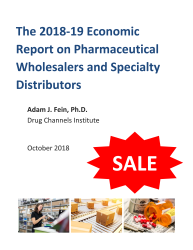This has been the most impactful article that I have ever published on Drug Channels. Review it and get ready for 2019.
P.S. You can also find this material at www.WorldWithoutRebates.com. (Yes, we bought that domain!)
Are you ready for a world without rebates?
In June, Alex Azar, Secretary of the U.S. Department of Health & Human Services (HHS), summarized his long-range vision for a new drug channel system:
“[W]e may need to move toward a system without rebates, where PBMs and drug companies just negotiate fixed-price contracts. Such a system’s incentives, detached from artificial list prices, would likely serve patients far better.” (emphasis added)No one has yet explained what a system without rebates would look like.
To facilitate the discussion, I have sketched out a possible new drug channel system that would:
- Respond to the HHS vision for a “system without rebates”
- Remove/decrease the reliance on list price as a component of intermediary compensation
- Use negotiated discounts as an alternative to the current system of retrospective rebates
- Require manufacturers to negotiate for desirable market access
Please note that I am not advocating for this approach. I am merely exploring one way that a system without rebates could be implemented. I hope you find it helpful for your strategic planning.
As always, I welcome feedback on how to improve and refine this model. Either leave comments below or email me. Enjoy!












































